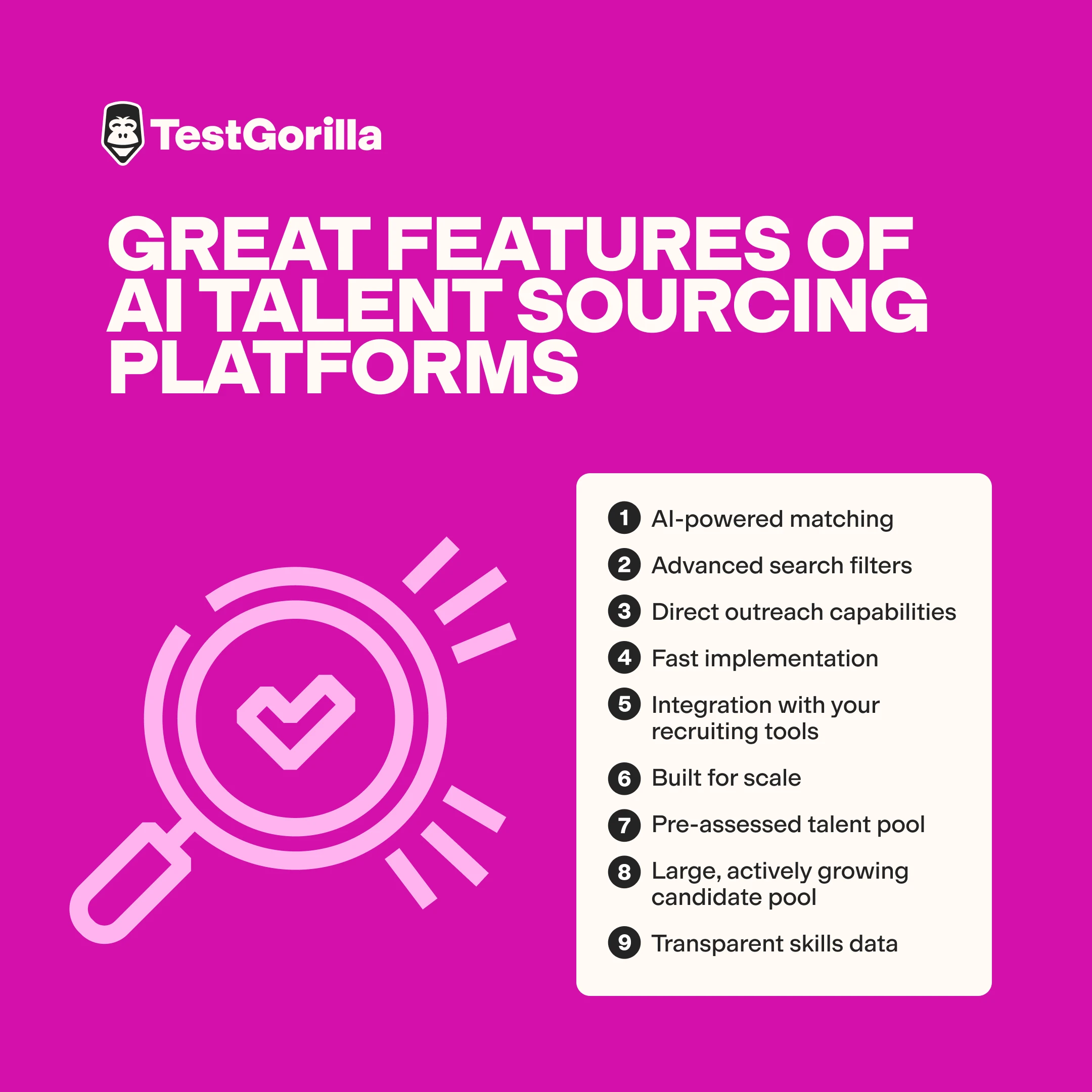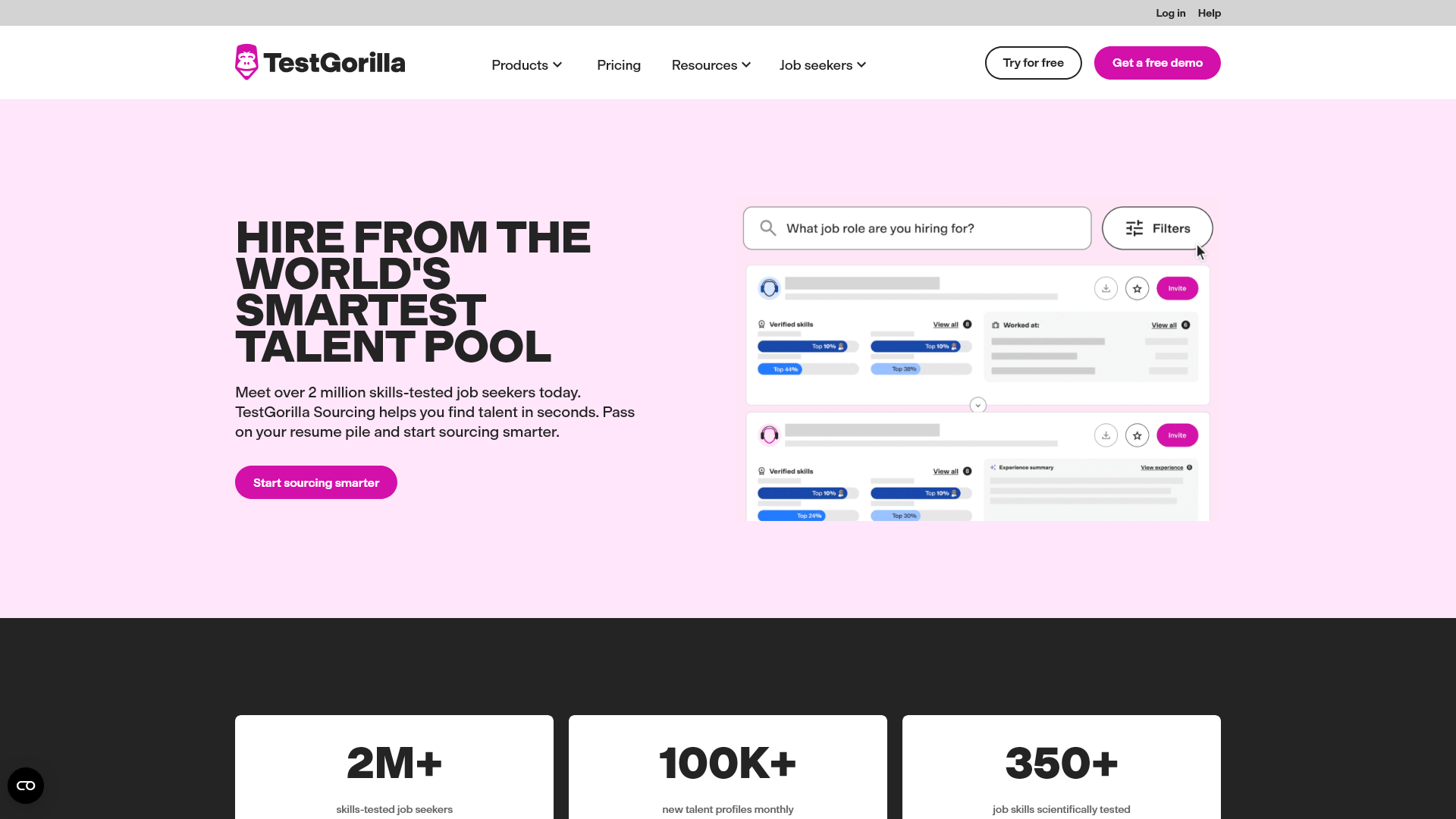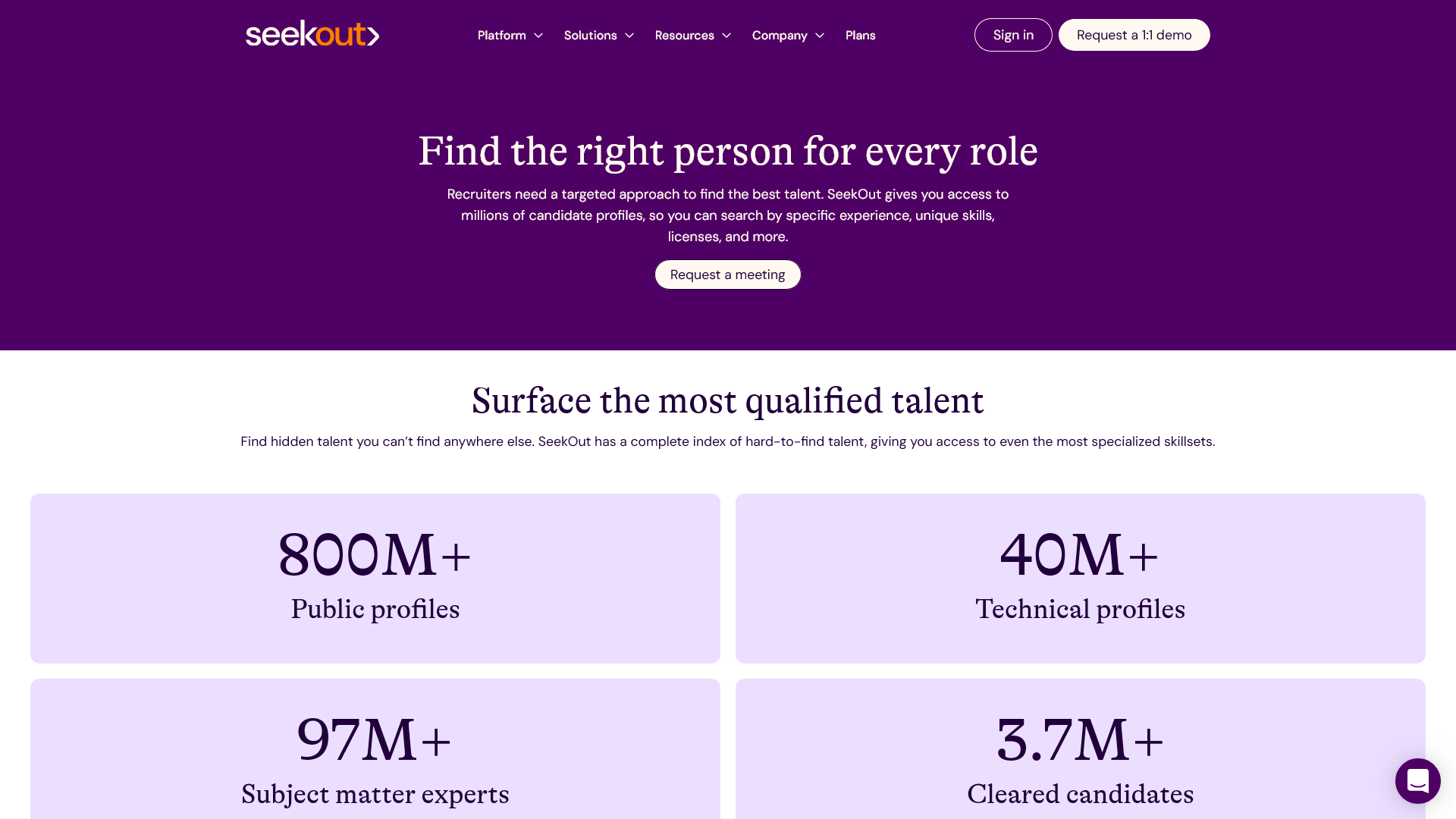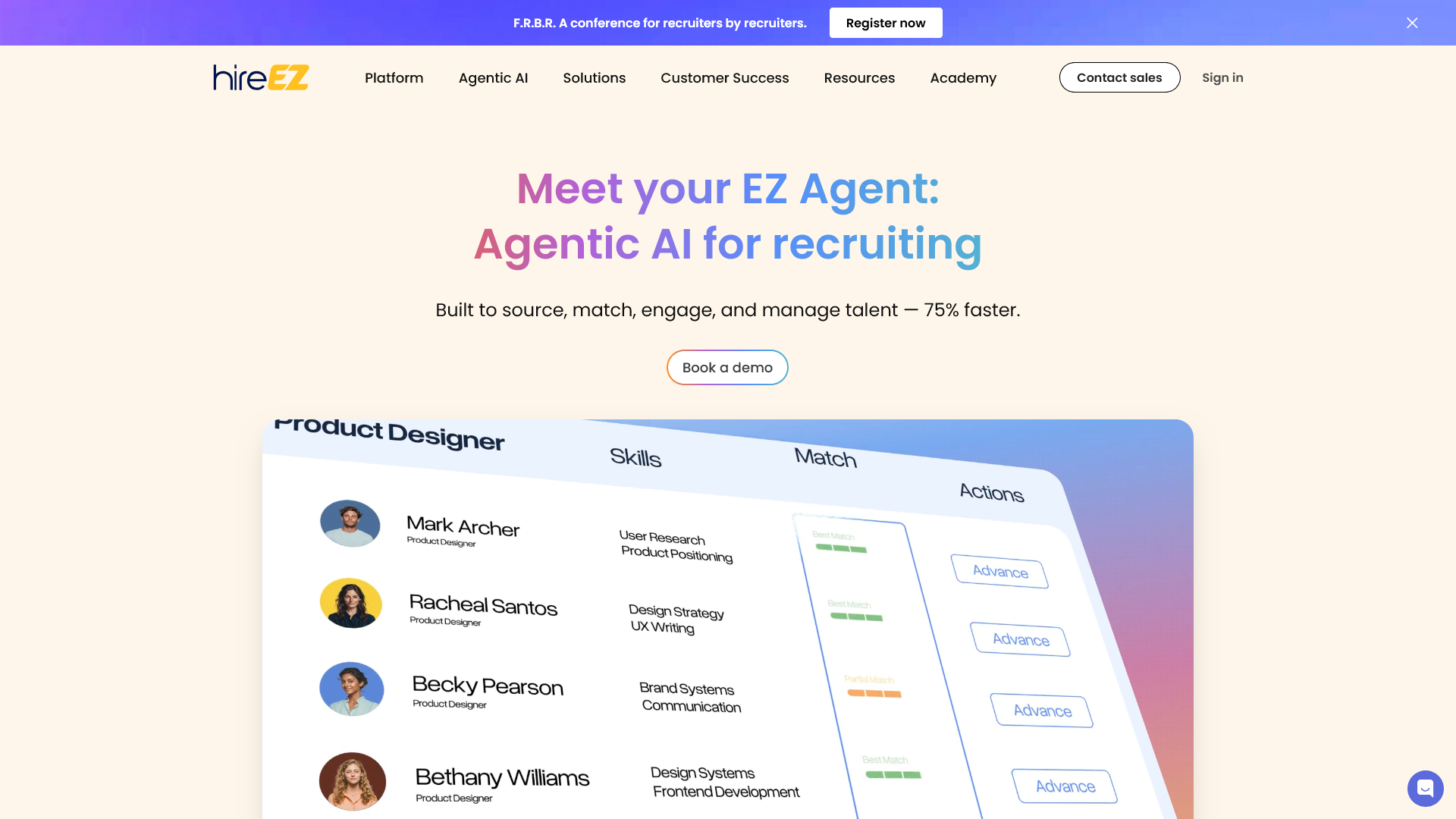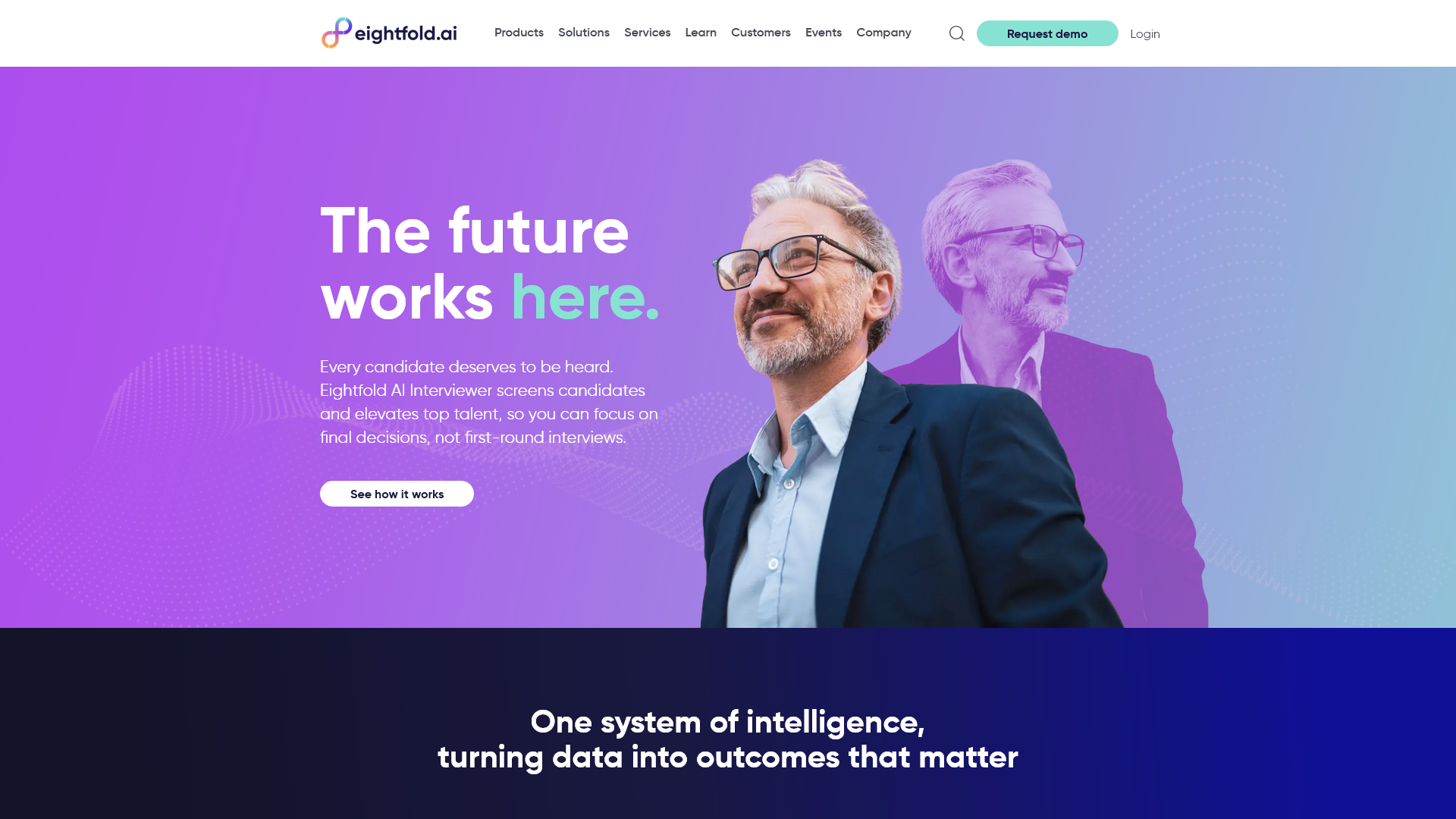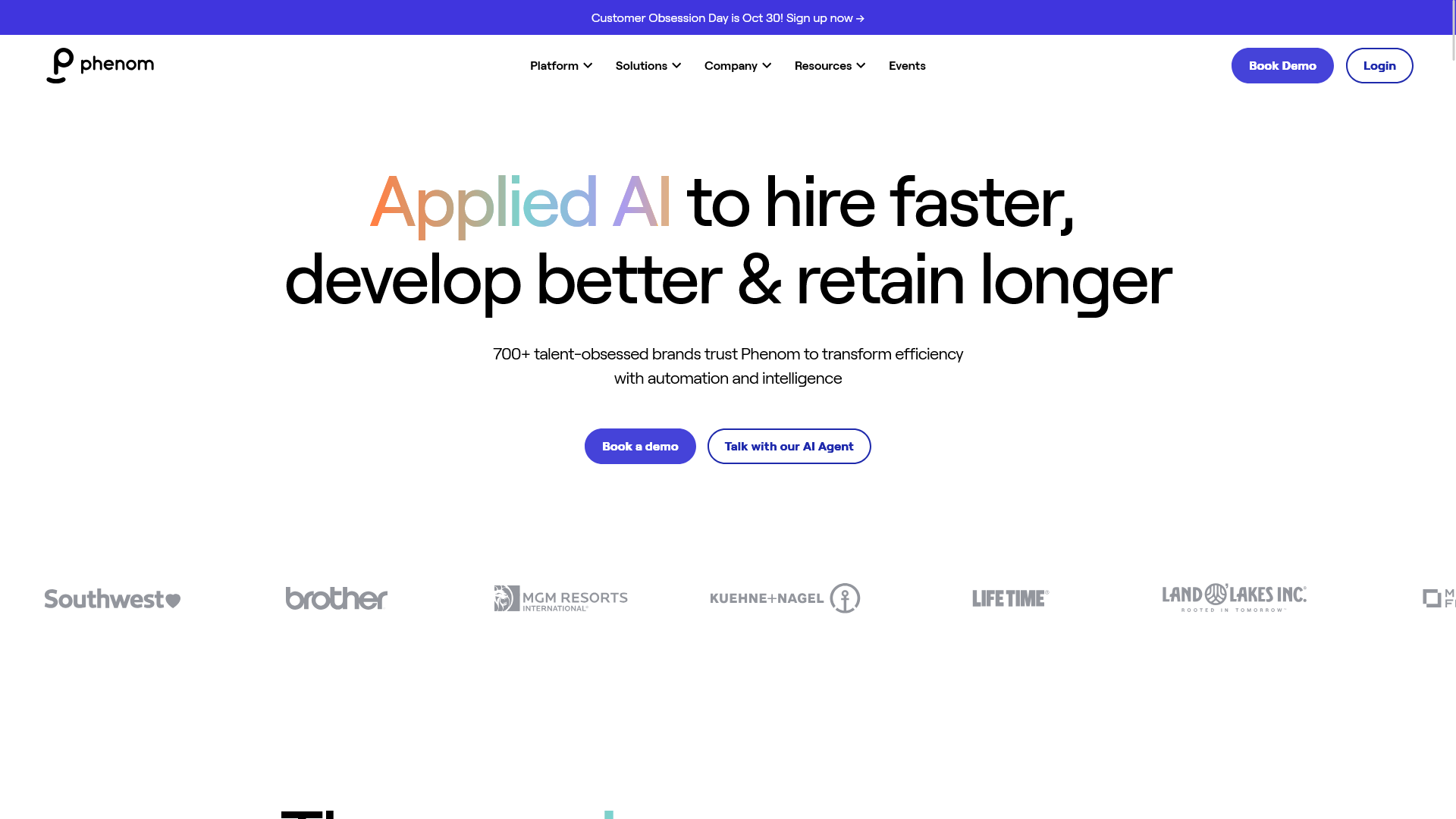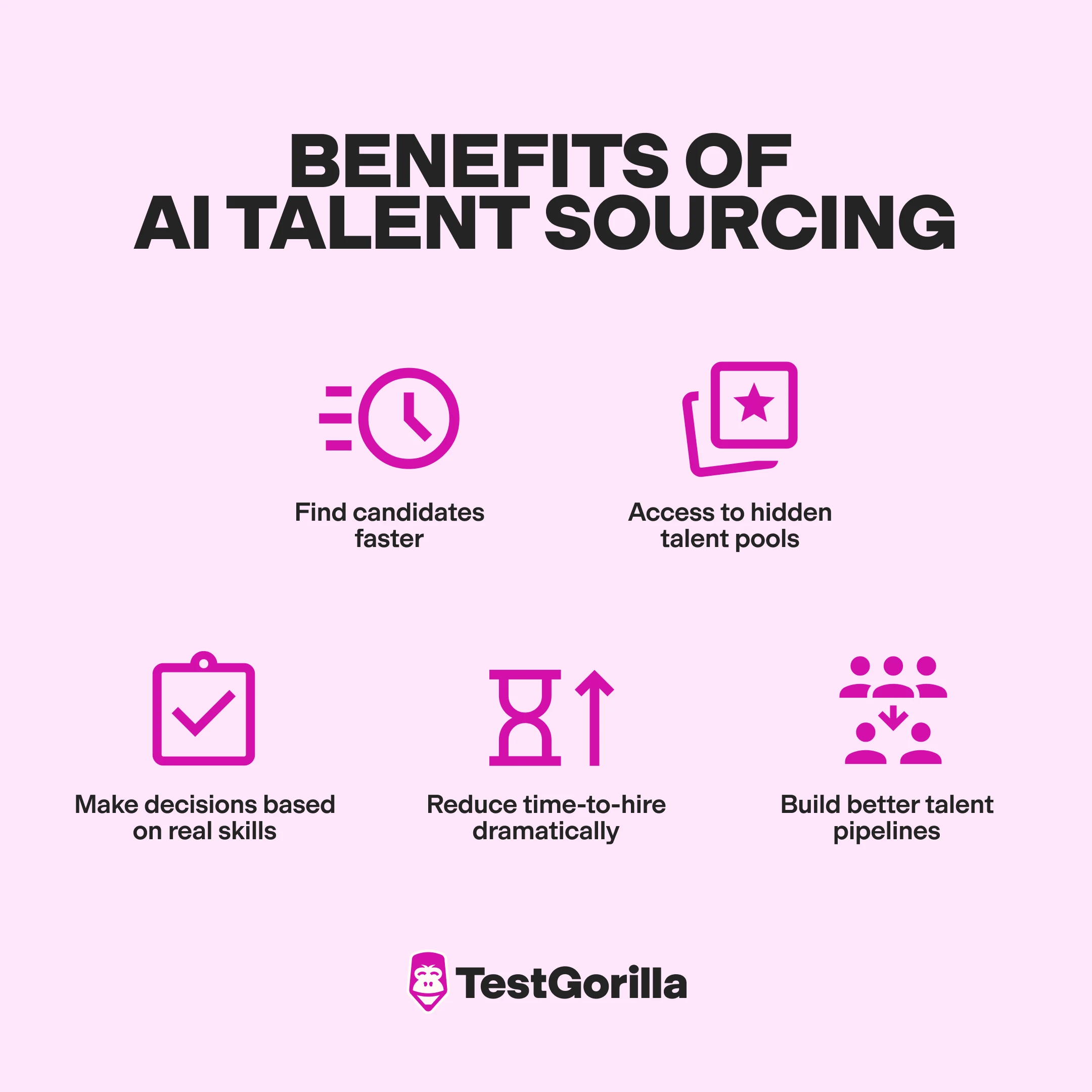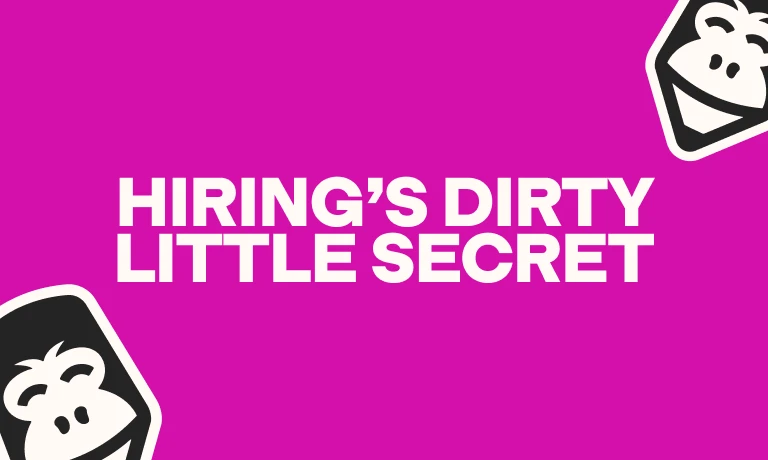Manual screening is slow and often leaves you buried in unqualified applicants’ resumes.
AI talent sourcing tools find better-matched passive candidates and can even verify their skills before you engage, letting you hire smarter and faster.
In this article, I share the best AI talent sourcing platforms and explain how you can use AI tools to easily find your next hire.
How I chose the 5 best AI talent sourcing platforms
Hundreds of recruiting platforms say they have AI features, so I compiled a list of the features that solve your biggest recruiting bottlenecks: finding quality candidates and confirming they have the skills you need.
First, I considered these the non-negotiable features you need to effectively source talent:
AI-powered matching so you can find candidates based on their actual skills, not just keywords.
Advanced search filters so you can instantly narrow thousands of profiles by location, salary, and experience.
Direct outreach capabilities so you can contact talent immediately via verified email or InMail, skipping the “apply” step.
I also made sure the software is:
Fast to implement so your team can be sourcing in days, not months.
Integrates with your recruiting tools so you can eliminate duplicate data entry.
Built for scale so you can handle both niche technical roles and high-volume hiring without breaking your budget.
Finally, I checked for features that made AI sourcing tools great:
A pre-assessed talent pool so you can find talent who’ve already passed skills tests.
A large, actively growing candidate pool that updates frequently so you get fresh candidates, not the same stale profiles from years ago.
Transparent skills data so the tool shows you why someone is a match with test scores or validated skills.
With these features in mind, let's look at the AI talent sourcing tools that offer the best combination.
The 5 best AI talent sourcing platforms
1. TestGorilla
Best all-in-one AI talent sourcing and assessment platform Platforms: Web, iOS, Android
Why I chose TestGorilla: TestGorilla offers AI-powered talent sourcing and assessments that help you find and hire candidates based on verified skills. I picked it because it gives you access to a pool of more than 2 million job seekers who've already proven their abilities through TestGorilla's 350+scientifically validated tests. This prevents you from wasting time on LinkedIn searches that pull up the same recycled profiles.
Source from a skills-tested talent pool
What I most like about TestGorilla Sourcing is that every candidate has already completed at least one verified assessment. I like seeing actual test scores when evaluating who to contact. For example, when you search for a senior marketing manager, you get to see candidates who scored in the top percentile on relevant tests like Digital Marketing, Google Analytics, and Content Strategy.
Another thing important to me is finding fresh talent. More than 100,000 new candidates join TestGorilla’s database every month, and you know that they’re all people actively looking for work.
AI-powered matching that can find hidden talent
I like how TestGorilla AI helps you find candidates who have related skills (based on your job title or job description) even if their job titles don't match your search exactly. It’s much better than the basic type of searches you get on traditional hiring platforms.
You can filter on things like skills, location, salary expectations, and years of experience, and TestGorilla instantly shows you qualified matches. You can, for instance, quickly find all the sales managers in Denver who are comfortable with remote work and expect a $75,000 to $95,000 salary. From there, you can immediately see all people who have scored highly on relevant tests. It really speeds the process up.
Sending custom assessments when you invite candidates
I like that once you’ve found candidates who fit the bill, you can send them a custom assessment tailored to your particular position. TestGorilla’s custom assessments are really flexible. You can mix and match from the 350+ skills tests and add your own custom questions.
You can even use AI video interviews where an AI persona conducts a structured interview with candidates. By default, these ask between 3-7 questions on relevant topics. They’re not designed to replace actual interviews – instead, they’re more like an interactive video screening interview.
From a time-saving point of view, I really like TestGorilla’s auto-scoring systems. The AI can auto-score open-ended responses, so you don’t have to spend hours manually reviewing essay answers or video responses.
Side-by-side candidate comparisons
Finally, I need to highlight how great the reports you get on candidates are with TestGorilla. You can see exactly how each person scored on specific tests, review their behavioural assessment patterns, and understand their work preferences before you even talk to them.
There are a wealth of filters built into TestGorilla that make it really easy to drill down to the candidates who really shined during testing, saving you a heap of time. And because you’re looking at actual test scores, you’re eliminating bias and hiring on ability.
Key features
Access to 2M+ candidates who've already taken tests with verified scores
AI matching based on skills, location, salary, and experience
350+ scientifically validated tests
Smart filters that find people you'd miss with traditional searches
Side-by-side candidate comparisons using objective data, plus other analytics
Direct invitation system with customizable messages
Pros & cons
Skills-tested talent pool eliminates resume guesswork
Integrates sourcing with assessment and screening
Fresh profiles added constantly (100K+ monthly)
Transparent pricing with no hidden costs
Talent pool is still growing compared to LinkedIn's network size
Pricing
Intelligent talent matching starts at $142/month
Free plan available for assessments
2. SeekOut
Good for deep-web sourcing of highly technical and diverse talent
Why I chose SeekOut: SeekOut helps users find candidates from publicly available sources, like GitHub, professional networks, and online portfolios. The platform has amassed more than 800 million candidate profiles. It’s mostly aimed at hiring for highly technical roles or from harder-to-reach talent pools.
Recruiters can search by security clearances, programming languages, academic credentials, and diversity demographics. I like how SeekOut also connects with major applicant tracking systems (ATS) like Workday and Jobvite, so users can move candidate data over without retyping everything.
The main issue I’ve noticed is that SeekOut scrapes its data from public sources across the web – and that information goes stale quickly. Users often say contact details are wrong and work histories can be months out of date.
Key features
800M+ profiles from open web sources
300+ advanced filters for technical skills and diversity sourcing
Dedicated healthcare talent pool with 31M+ qualified candidates
Automated email sequences to stay in touch with potential candidates
Pros & cons
Access to specialized technical and diverse talent
Advanced search with ready-made filter options
Frequent data accuracy issues with outdated contact information
Steep learning curve for advanced search features
Price
Custom pricing based on team size and features, billed annually
Free trial available: No. Sales demo only
Free plan: No
What users say about SeekOut
Users often praise SeekOut's search capabilities. One reviewer notes, “The Boolean function provides a lot of advanced searching techniques and their pre-made Power Filters take out some of the extra work needed to identify candidates.“
The main weakness is data accuracy. A reviewer reports, “Sometimes the data is not accurate with LinkedIn, we don´t find the profile or even the contact information is incorrect.“ Another user adds, “We find that profiles are often times well out of date, sometimes up to 6 months.“
3. hireEZ
Good for high-volume outbound recruiting with automated engagement
Why I chose hireEZ: hireEZ pulls profiles from more than 45 sources like LinkedIn, GitHub, and AngelList, then combines the information to create more complete candidate profiles.
I appreciate its focus on automating the recruitment process. Users can set up a series of emails that send automatically over time. Candidates can book meetings with recruiters through the website. hireEZ can be used to write personalized outreach emails based on job descriptions. There’s also a feature for searching a company’s list of past applicants and former employees to find those who might be a good fit for a role.
One issue I’ve found is that hireEZ’s AI matching often brings back candidates who don’t quite fit what’s being searched for. Users commonly complain that they need to manually adjust their search criteria several times to narrow things down to the right candidates. Another complaint I’ve heard from recruiters is that hireEZ’s credit system is too expensive and renewal prices are high.
Key features
Multi-channel sourcing from 45+ platforms
AI-powered email generation
Finds past applicants in your hiring system worth contacting again
Filters for diverse candidates and specialized roles
Pros & cons
Automates a lot of the recruitment process
More affordable than LinkedIn Recruiter with comparable functionality
AI candidate matching often requires manual refinement
Data accuracy issues with bounced emails
Price
Custom pricing based on team size and features needed
Free trial available: Yes
Free plan: No
What users say about hireEZ
Users often suggest hireEZ as an alternative to LinkedIn. One user says, “HireEZ speeds up outbound recruiting and makes it way more scalable. Getting around LinkedIn's connection limits and pulling full profiles from different platforms has totally changed how I find hidden or hard to reach talent.“
But data accuracy remains a challenge. Another reviewer comments, “Every now and then the email contacts are not accurate or bounce back so I end up having to verify them manually.“
4. Eightfold.ai
Good for enterprise talent management with a focus on internal mobility
Why I chose Eightfold.ai: Eightfold.ai is designed to help with workforce management, from finding candidates to developing and keeping employees. It uses AI trained on career paths and skills to understand how people’s careers develop over time.
I like how Eightfold.ai includes features for finding internal talent, so recruiters can fill positions by moving people within the company instead of hiring externally. When looking outside the company, an AI finds candidates who have related skills even if their job titles don’t match the search terms exactly.
Eightfold.ai has an AI Interviewer that handles initial screening interviews. It’s primarily a conversational screening tool, though, rather than part of a comprehensive skills-testing suite.
The most common complaint I hear from recruiters on Eightfold.ai is on its steep learning curve and complexity. There are also many reports detailing the challenges of integrating Eightfold.ai with ATS software, causing frustration.
Key features
Internal system for matching employees to open roles
AI matching that finds people with related skills, not just exact titles
AI Interviewer for automated initial candidate screening
Single platform connecting sourcing, management, and development
Pros & cons
Reduces external hiring needs if internal hires are found
AI matching can surface overlooked candidates
Steep learning curve due to platform complexity
Buggy ATS integrations reported by users
Price
Custom enterprise pricing only
Free trial available: No. Sales demo only
Free plan: No
What users say about Eightfold.ai
One user states, “Eightfold's interface and features have made our candidate management experience more efficient and enjoyable. We have especially seen efficiencies in our interview scheduling and interview feedback.“
Others find the focus on internal mobility a potential hindrance. “My concern is that I'm sourcing through talent that is limited to the pool of candidates/prospects my company has already engaged, rather than also extending to new prospects who may have never interfaced with our company before“, said one user.
But the main drawback is complexity. A recruiter notes it “does take some time to learn how to effectively use,“ and another says “it can be a bit complicated to use.“
5. Phenom
Good for enterprise high-volume hiring with candidate experience focus
Why I chose Phenom: Phenom is designed for companies that need to hire large numbers of people quickly. The platform includes tools for finding new candidates, as well as managing and developing existing candidates.
A key feature is Phenom’s 24/7 AI chatbot, which a company embeds on its own website. When a job seeker visits the site, the AI assistant can answer candidate questions and act as a first line of screening, asking basic questions to see if the candidate meets the role’s minimum requirement. I think this could be engaging for candidates while being practical for screening purposes.
Phenom assigns each applicant an “fit score”, indicating how well they match a role, allowing the hiring team to prioritize the strongest matches. Candidates can be organized into lists to build talent pools for when future positions open up.
Users say the main interface is intuitive and easy to learn. But unfortunately, I noticed the analytics module gets complaints for being overly complex and difficult to navigate. Data accuracy issues pop up too – problems with imports and syncing between Phenom and a company's other HR systems can slow things down.
Key features
24/7 AI chatbot for candidate questions and initial screening
AI-driven career sites with personalized job recommendations
Tools for organizing candidates into lists and staying in touch
Automated scheduling and candidate scoring
Pros & cons
Intuitive interface
Good for high-volume hiring with advanced automation
Analytics module is complex and difficult to navigate
Data accuracy and syncing issues reported by users
Price
Custom enterprise pricing only. Cost depends on company size, modules, and usage
Free trial available: No. Sales demo only
Free plan: No
What users say about Phenom
“Phenom is very user-friendly, which is helpful for those who are not tech-savvy,“ says Alexis K., an HR senior specialist in talent acquisition.
But this ease-of-use isn't mirrored in the use of Phenom's analytics, which users say is “very difficult to get data from that we need.“ They also say “the data needs to be clean and updated“ and reporting needs to “be a bit more in depth and easier to pull specific data.“
→ Want to see our thoughts on other talent sourcing software? Check out our other reviews, including our Fetcher review.
The best insights on HR and recruitment, delivered to your inbox.
Biweekly updates. No spam. Unsubscribe any time.
What is AI talent sourcing?
AI talent sourcing means using artificial intelligence to find, evaluate, and reach out to potential candidates for your open roles. You're going after people directly instead of sitting around waiting for applications to roll in.
AI sourcing is a subset of talent intelligence. It uses machine learning to understand your job descriptions, match candidates based on skills and experience, and even predict which candidates are most likely to respond or accept offers. The AI scans millions of profiles, filters based on what you need, and brings back the most relevant matches in seconds. Recommended reading:
Check out TestGorilla’s deep dive into AI in talent acquisition.
Discover what AI in recruiting means for talent sourcing today.
How does AI talent sourcing work?
AI talent sourcing platforms pull candidate data from multiple sources like job boards, professional networks, resume databases, and their own talent pools. The AI looks at this data to build fuller candidate profiles that go deeper than what's on a resume.
When you enter what you're looking for, the AI uses natural language processing to understand your needs. It matches candidates based on skills, experience, location, and other factors. The AI often finds people who might have different job titles but have the right abilities.
The best platforms also score candidates based on how likely they are to be a good fit. They learn from your previous hiring choices and get better at recommendations over time.
The benefits of AI talent sourcing
You find candidates faster
Manual sourcing is slow. You spend hours switching between tabs, copying contact info into spreadsheets, and crafting individual messages. AI sourcing platforms eliminate all that. You set your criteria once, and the AI instantly pulls matches. What used to take three days now takes three minutes.
You access hidden talent pools
Most recruiters post on the same job boards, search the same LinkedIn profiles, and compete for the same active job seekers. AI sourcing tools can find people who aren't actively looking for jobs but would consider the right opportunity.
You make decisions based on real skills
Resumes lie – sometimes intentionally, often through exaggeration. Someone might list “expert in Excel“ when they've only used basic formulas. Another candidate could downplay their abilities because they lack a traditional degree. You can’t tell who’s inflating or downplaying their experience until you spend time on screening calls, which are already inefficient and unreliable (as we explain in our breakdown of why phone screen interviews are broken).
AI sourcing tools that include skills assessments change this entirely. You see verified test scores before you ever reach out. This eliminates resume bias and brings up talent you might have otherwise overlooked.
You reduce time-to-hire dramatically
Every day a role sits open costs money. AI sourcing speeds up every stage of the hiring process. You find candidates faster. You engage them with automated outreach. You screen them with built-in assessments. You move straight to final-stage interviews with the best matches.
You build better talent pipelines
Don't just think about filling today's open roles. The best platforms let you build lists of promising candidates for future needs. You can save people who look good, stay in touch with them through automated messages, and reach out when a relevant role opens.
This means you're never starting from scratch. You've already found and warmed up qualified candidates.
→ Discover our guide to the best recruiter sourcing tools for better pipelines.
FAQs
What is AI sourcing?
AI sourcing uses artificial intelligence to find and engage candidates for your jobs. The AI scans databases, matches people to your criteria, and automates outreach. For example, TestGorilla’s AI sourcing tool connects you with more than 2 million candidates who've already taken skills tests.
How is AI used in HR recruitment?
AI automates the time sinks like screening resumes, matching candidates, and sending initial messages. It analyzes job descriptions, searches candidate pools, and predicts who's likely to succeed. TestGorilla uses AI to match you with pre-assessed candidates so you can skip the laborious resume review.
What AI tools are best for talent sourcing?
The best AI sourcing tools give you access to quality candidates and integrate with your recruitment workflow. TestGorilla leads because every candidate in its pool has verified skills through testing. You see what people can do before you reach out.
The bottom line on AI talent sourcing
Slow sourcing can kill your chance at top talent, but talent sourcing platforms won’t. The best platforms are those that show you verified skills data before you invest interview time.
TestGorilla Sourcing tops my list because you source from a pool of more than 2 million candidates who've already taken skills tests and filter by the exact skills and requirements you need for the role.
Take advantage of TestGorilla’s skills-tested talent marketplace by signing up for free today, or book a demo and we’ll show you exactly how easy it is to improve your company’s talent sourcing.
You've scrolled this far
Why not try TestGorilla for free, and see what happens when you put skills first.


